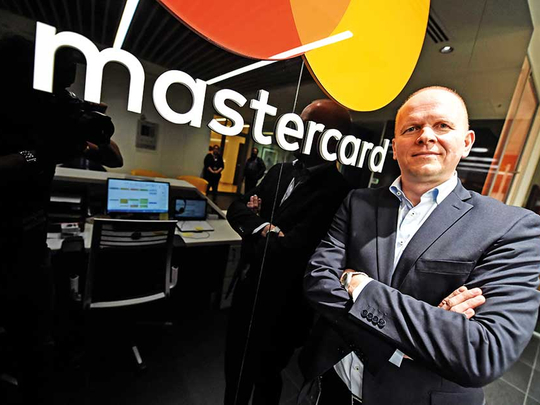
Dubai: Banks are under tremendous pressure from concerns over safety, security and regulations. Banks need to change and they are changing and are in the midst of a perfect storm, said Michael Miebach, chief product officer at Mastercard.
He said that consumers trust their banks when compared to fintech start-ups that are mushrooming globally. People are looking at banks for innovation.
“Our partnerships with banks are to step up innovation regarding safety and security. Digitising everything that happens around the bank is what we are focusing on,” he said.
The benefit the fintech start-ups have is that they don’t have the legacies of banking and backbone systems that have been put in place for scalable, resilient and high safety type of procecies. They can spill whatever they want, he said.
“We want the new technologies to come into the market but banks have one big advantage in the minds of the consumers and that is the trust. If it is a high-value transaction, I don’t think anybody will give it to a fintech,” he said.
Effective partnerships between banks and technology providers are “crucial to the long-term growth and development of the banking industry” in the region.
He said that it is extremely important for bankers to understand the full extent of the digital revolution that is impacting all aspects of the financial industry.
Being a technology company, he said that it is their duty to convince banks how technology can best be leveraged to continuously stay ahead of the curve and capitalise on the emerging digital trends to drive greater value to consumers.
“The current era of innovation is impacting the world of banking and banks need to stay competitive and relevant in today’s fast-changing world,” he said.
Mastercard sees 2017 as a year of economic uncertainty and changes in spending behaviour of consumers around the world.
Despite economic uncertainty, he said that there is a drive around the world to displace cash with electronic payments.
“[The] UAE has an excellent opportunity to go beyond plastic. Even though the country is very sophisticated, 90 per cent of the transactions are made by cash and cheques whereas it is 85 per cent in rest of the world,” he said.
When asked what can be done to displace cash, he said that attractive and technological solutions that people will adopt.
Who is likely to adopt something new, he said it is the young people. The region has more than 70 per cent of the people under the age of 30.
“That is the perfect combination for us. We have been constantly increasing our footprint in the region.
We are bullish on the region and it is one of the growing markets for us,” he said.
In the next five years, he said the world will see more changes in the payments industry than in the last 50 years. Electronic payments are becoming a “better alternative” to cash.
He said the UAE hosts a sophisticated consumer segment that has expressed keen interest in adopting “contactless payment solutions.” However, contactless payments are not widely available, due to lack of infrastructure to accept such payments.
Mastercard rolled out the mobile wallet in the UAE in 2014 and its cardholders from select banks in the UAE will now be able use the Samsung Pay service to make payments in a quick and secure way.
“Mastercard has been actively driving contactless payments in the market, offering partners and their consumers safe, simple and convenient solutions,” he said











